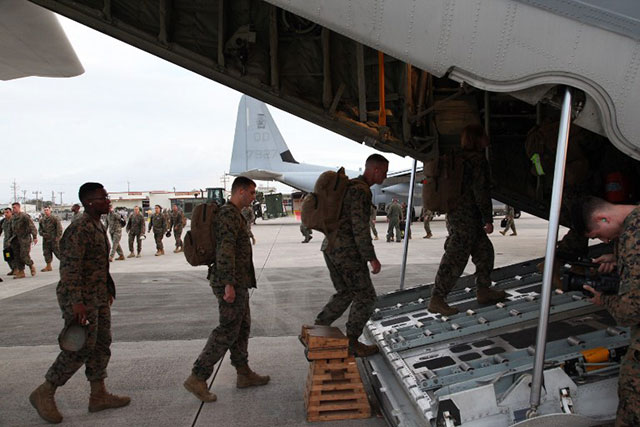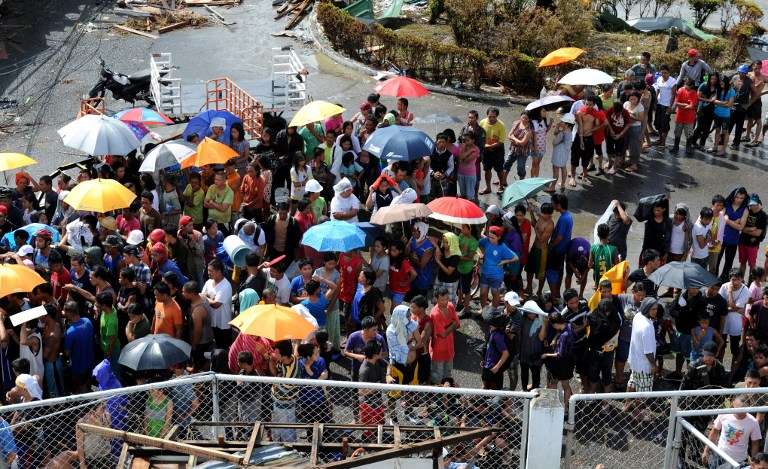
TO TACLOBAN.
US military planes Monday, November 11, joined a frantic effort to rescue famished survivors of a monster typhoon that may have killed 10,000 people in the Philippines, as local security forces struggled to contain looting.
Three days after Super Typhoon Yolanda (Haiyan) flattened entire towns across the central Philippines and left countless bodies scattered across wastelands, desperation was building with devastated communities devoid of food, water and medicines.
"We want an organized, coordinated brigade to collect the dead bodies, bring food and stop the looting," said Joan Lumbre-Wilson, 54, who was among a large crowd of people gathered around one of the few relief centers in the ruined city of Tacloban.
"It has been four days. We want water and food. We want someone who will help. We are emotionally drained and physically exhausted. There are many babies and children who need attention," she said.
Haiyan generated waves up to 5 meters (16 feet) high that surged inland like a tsunami, the walls of water destroying nearly everything in their path along huge stretches of coastlines throughout the central band of the archipelago.
About 10,000 people are believed to have died just in the eastern province of Leyte, of which Tacloban is the capital, according to the region's police chief.
Philippine authorities have been overwhelmed, their efforts to quickly deliver aid hamstrung by the destruction of airports, roads, bridges and other infrastructure.
Many areas remained cut off from any relief efforts, leaving bodies to rot in the humid atmosphere and survivors little choice but to rummage through the carnage for food, water and other essentials.
The scale of the disaster continued to unfold on Monday, with aerial photos of Samar island where Haiyan first made landfall showing whole districts of coastal towns reduced to piles of splintered wood.
Yolanda's sustained winds when it hit Samar reached 315 kilometers (195 miles) an hour, making it the strongest typhoon in the world this year and one of the most powerful ever recorded.
The governor of Samar said 433 people were confirmed killed there, although this was widely expected to be an underestimate.
US Marines arrive as new storm builds
In Tacloban, US military C-130 planes full of relief supplies began arriving on Monday afternoon.
The planes, with Marines aboard, were the most visible sign of a major international relief effort that had begun to build.
Many foreign governments have pledged help, with Australia donating nearly US$10 million, while United Nations leader Ban Ki-moon promised UN humanitarian agencies would "respond rapidly to help people in need".
The United Nations Children's Fund sounded a loud alarm about the urgency of getting relief supplies into the disaster zones, with the organization estimating up to four million children could be affected.
"We are rushing to get critical supplies to children who are bearing the brunt of this crisis," said UNICEF Philippines representative Tomoo Hozumi.

WAITING FOR AID.
Typhoon survivors queue up to receive relief goods being distributed at the
Tacloban airport in Tacloban City , Leyte , on
November 10, 2013. AFP/ Ted Aljibe
"Reaching the worst-affected areas is very difficult. But we are working around the clock."
Adding to concerns was a looming storm in the Pacific Ocean that threatened to dump heavy rain across Leyte and other devastated areas.
The depression is expected to hit land on the southern island of Mindanao late Tuesday, then move across the central islands of Bohol, Cebu, Negros and Panay, which all suffered typhoon damage, weather forecaster Connie Dadivas told Agence France-Presse.
He said those areas, as well as Leyte slightly to the northeast, would start experiencing rain as early as Monday.
Mobs attack aid supplies
Hundreds of Filipino police and soldiers were deployed to contain looters in and around Tacloban, after mobs ransacked a Red Cross aid convoy on Sunday and gangs roamed the streets stealing consumer goods such as televisions.
"We have sent substantial (forces) there and if we need to add some more, it won't be just the police but even the armed forces," civil defense office spokesman Reynaldo Balido said on ABS-CBN.
Haiyan swept out into the South China Sea on Saturday and hit Vietnam on Monday in a significantly weakened state, although still strong enough to uproot trees and tear roofs off hundreds of homes.
National disaster officials in Vietnam said no deaths had been reported on Monday, although state media said five people had died during preparations for the typhoon.
More than 650,000 people were evacuated over the weekend as the weather system bore down on Vietnam, but state media said all of the evacuees had now returned home.
Farther north, six members of a cargo boat went missing off the Chinese province of Hainan over the weekend, state media in China reported.
The Philippines endures a seemingly never-ending pattern of deadly typhoons, earthquakes, volcano eruptions and other natural disasters. Many of them claim hundreds of lives.
But if the death toll of more than 10,000 is correct, Yolanda would be the deadliest natural disaster ever recorded in the country, exceeding the 1976 Moro Gulf tsunami that killed between 5,000 and 8,000 people.
http://www.rappler.com/nation/43435-us-military-joins-philippines-typhoon-rescue-race

No comments:
Post a Comment
Note: Only a member of this blog may post a comment.